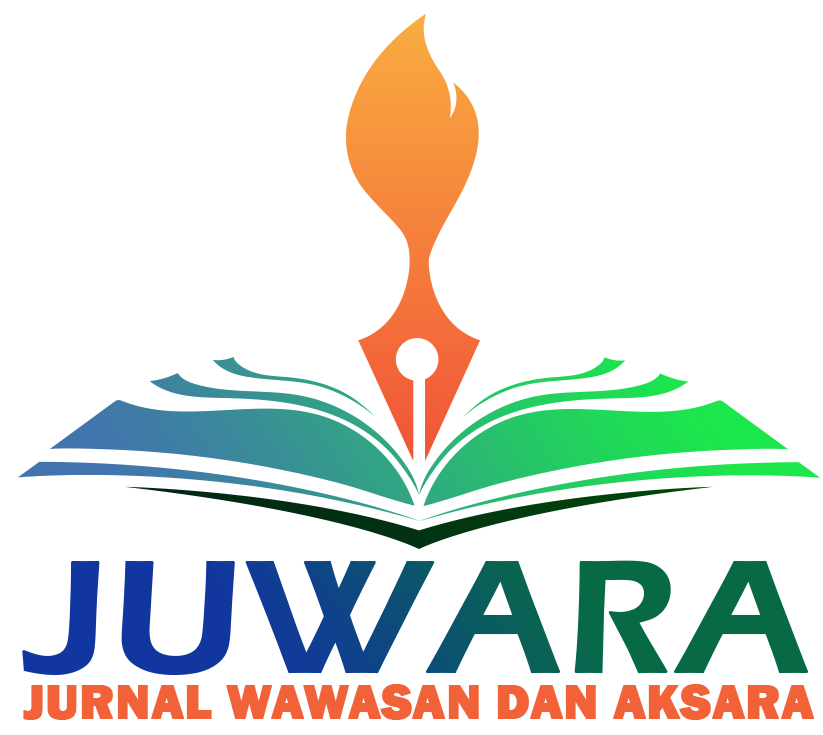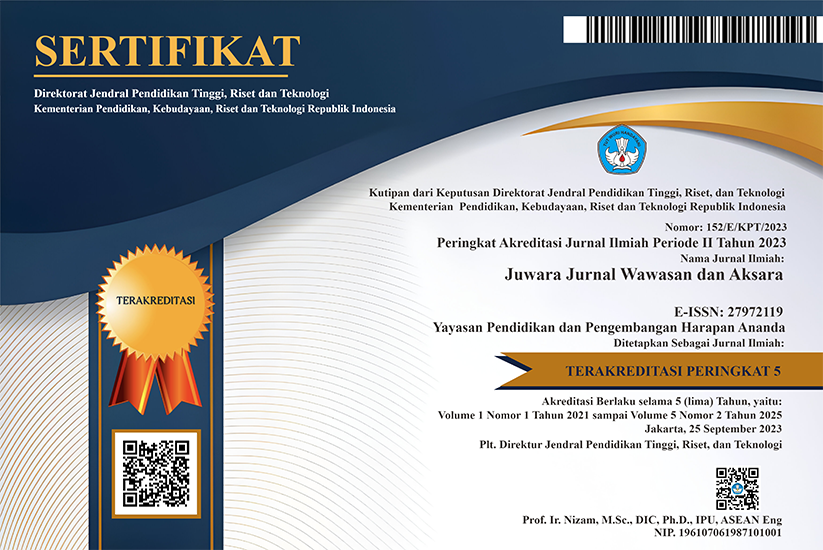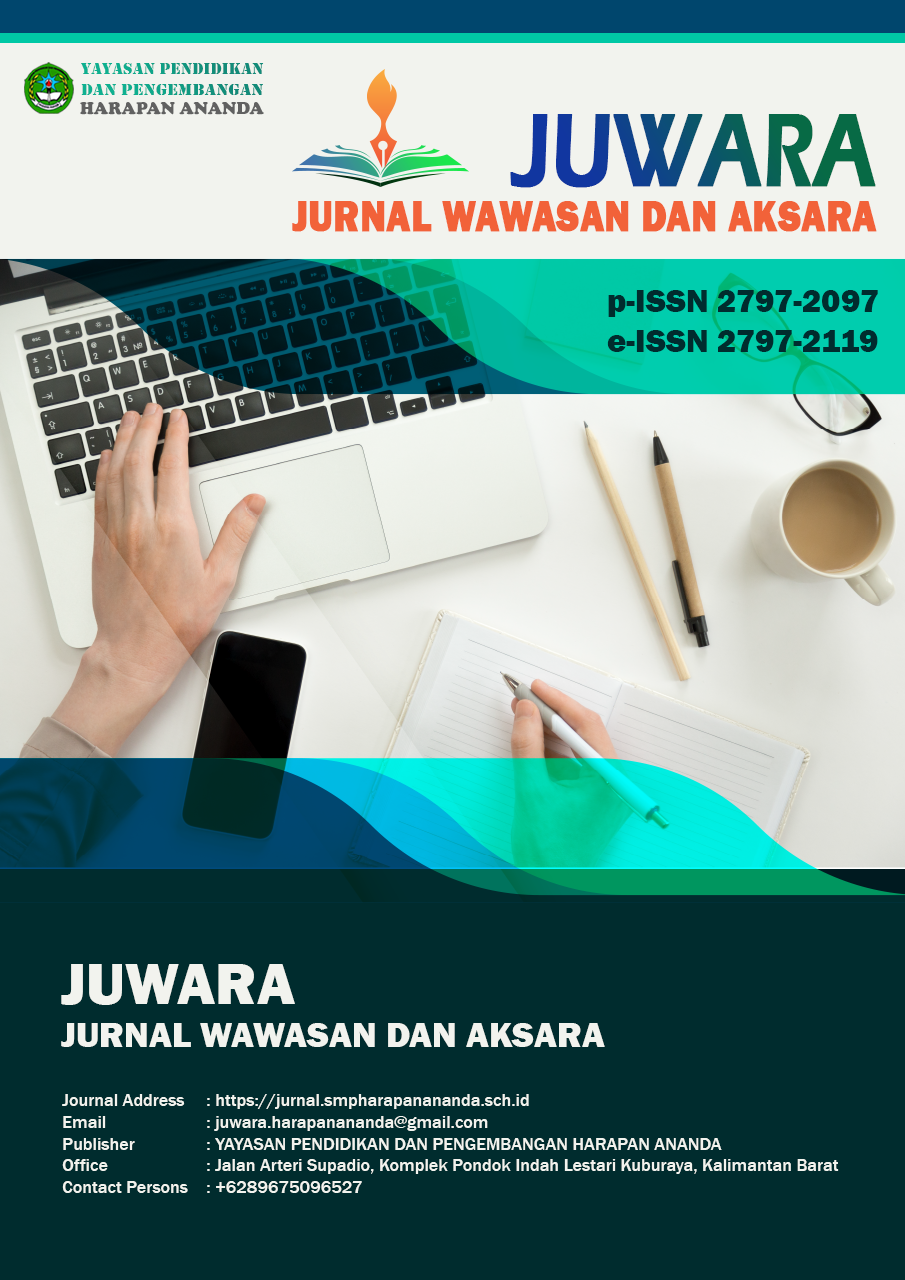Enhancing Student Creativity through Project Based Learning in Indonesia’s National Curriculum
DOI:
https://doi.org/10.58740/juwara.v5i1.598Keywords:
creative, national curriculum, primary school, project based learningAbstract
This study examines the impact of Project Based Learning (PjBL) on student creativity within the National Curriculum at elementary schools. Using a quantitative experimental design, the study involved two groups: the experimental group applying PjBL and the control group following conventional learning methods. The sample consisted of 120 fifth grade students divided into these two groups. Data were collected through a validated creativity test administered before and after the intervention. The results revealed that the experimental group showed a significant increase in creativity compared to the control group. The average creativity score for the experimental group rose from 62.5 to 85.3, whereas the control group only increased from 61.4 to 65.2. These results demonstrate that implementing PjBL in the National Curriculum effectively enhances student creativity, particularly in problem-solving, originality of ideas, and collaboration skills. Consequently, PjBL can serve as a valuable method for fostering 21st-century skills, which align with the core objectives of Indonesia’s National Curriculum.
References
Ahsan, S., Islam, M. K., & Khan, M. R. H. (2024). Scope of Global Citizenship Education in the National Curriculum Framework 2021 of Bangladesh: A critical Review. Teacher’s World: Journal of Education and Research, 49(1), 49–76. https://doi.org/10.3329/twjer.v49i1.70238
Aji, A. P., & Wangid, M. N. (2022). Kontribusi Pola Asuh Orang Tua pada Penanaman Karakter Cinta Tanah Air Anak Usia Dini. Jurnal Obsesi?: Jurnal Pendidikan Anak Usia Dini, 6(4), 2718–2724. https://doi.org/10.31004/obsesi.v6i4.1135
Aji, K. A. (2023). Literature Review: The Relationship between Merdeka Curriculum and Student Learning Achievement. Jurnal Pendidikan Jasmani (JPJ), 4(1), 17–30. https://doi.org/10.55081/jpj.v4i1.732
Alabbasi, A. M. A., Paek, S. H., Kim, D., & Cramond, B. (2022). What do educators need to know about the Torrance Tests of Creative Thinking: A comprehensive review. Frontiers in Psychology, 13. https://doi.org/10.3389/fpsyg.2022.1000385
Diana, N., Yohannes, & Sukma, Y. (2021). The effectiveness of implementing project-based learning (PjBL) model in STEM education: A literature review. Journal of Physics: Conference Series, 1882(1), 012146. https://doi.org/10.1088/1742-6596/1882/1/012146
Fathonah, R. A., Handayani, T. O., & Indrapangastuti, D. (2023). The Role of Project Based Learning (PjBL) in Improving Elementary School Students. Social, Humanities, and Educational Studies (SHES): Conference Series, 6(1), 350–357.
Ferrero, M., Vadillo, M. A., & León, S. P. (2021). Is project-based learning effective among kindergarten and elementary students? A systematic review. PLOS ONE, 16(4), e0249627. https://doi.org/10.1371/journal.pone.0249627
Hakim, M. S. H. I. (2020). Implementasi Kolaborasi Orang Tua dan Guru Dalam Pelaksanaan Pembelajaran Daring pada PAUD. JIEES?: Journal of Islamic Education at Elementary School, 1(1), 26–33. https://doi.org/10.47400/jiees.v1i1.8
Halim, N., Boys, M., Fahmi, F., Nozaki, K., & Wuttipong, M. (2023). Implementation of Project-Based Learning in Indonesian EFL Class Between 2017 to 2022. Journal Neosantara Hybrid Learning, 1(2), 94–109. https://doi.org/10.55849/jnhl.v1i2.94
Iang, Wing, C. K., & Hoe, T. W. (2023). The cultivation of children’s musical creative practical competency: A literature review. Thinking Skills and Creativity, 48, 101309. https://doi.org/10.1016/j.tsc.2023.101309
Ilha Villanova, A. L., & Pina e Cunha, M. (2021). Everyday Creativity: A Systematic Literature Review. The Journal of Creative Behavior, 55(3), 673–695. https://doi.org/10.1002/jocb.481
Lewis, S. V., Robinson, E. H., & Hays, B. G. (2011). Implementing an Authentic Character Education Curriculum. Childhood Education, 87(4), 227–231. https://doi.org/10.1080/00094056.2011.10523183
Liang, M., Li, Y., Weber, T., & Hussmann, H. (2021). Tangible Interaction for Children’s Creative Learning: A Review. Creativity and Cognition, 1–14. https://doi.org/10.1145/3450741.3465262
Long, H., Kerr, B. A., Emler, T. E., & Birdnow, M. (2022). A Critical Review of Assessments of Creativity in Education. Review of Research in Education, 46(1), 288–323. https://doi.org/10.3102/0091732X221084326
Nurmala, E., Sabaruddin, Sultan, Hartati, D. V., & Siregar, M. S. (2024). Implementing Merdeka Curriculum by Strengthening Character Education (Literature Review). SABIQ?: Jurnal Sosial Dan Bidang Pendidikan, 1(1), 27–36. https://doi.org/10.62554/6re80f87
Pike, M. A., Hart, P., Paul, S.-A. S., Lickona, T., & Clarke, P. (2021). Character development through the curriculum: teaching and assessing the understanding and practice of virtue. Journal of Curriculum Studies, 53(4), 449–466. https://doi.org/10.1080/00220272.2020.1755996
Pulhehe, N. (2024). Indigenous knowledge in Indonesia curriculum development: Literature review of Indonesia’s education policy. Inovasi Kurikulum, 21(1), 97–108. https://doi.org/10.17509/jik.v21i1.61910
Restu, R., Sriadhi, S., Gultom, S., & Ampera, D. (2022). Implementation Of The Merdeka Belajar-Kampus Merdeka Curriculum Based On The RI 4.0 Platform At Universitas Negeri Medan. Journal of Positive School Psychology, 10161–10176.
Sutanto, S. (2024). Transformasi Pendidikan di Sekolah Dasar: Peran Guru dalam Mengimplementasikan Kurikulum Merdeka di Indonesia. Jurnal Guru Sekolah Dasar, 1(1), 69–76. https://doi.org/10.70277/jgsd.v1i1.0009
Wijnia, L., Noordzij, G., Arends, L. R., Rikers, R. M. J. P., & Loyens, S. M. M. (2024). The Effects of Problem-Based, Project-Based, and Case-Based Learning on Students’ Motivation: a Meta-Analysis. Educational Psychology Review, 36(1), 29. https://doi.org/10.1007/s10648-024-09864-3
Zulyusri, Z., Elfira, I., Lufri, L., & Santosa, T. A. (2023). Literature Study: Utilization of the PjBL Model in Science Education to Improve Creativity and Critical Thinking Skills. Jurnal Penelitian Pendidikan IPA, 9(1), 133–143. https://doi.org/10.29303/jppipa.v9i1.2555
Downloads
Published
How to Cite
Issue
Section
License
Copyright (c) 2025 Yoga Pratama

This work is licensed under a Creative Commons Attribution-NonCommercial 4.0 International License.
JUWARA: Jurnal Wawasan dan Aksara provides open access to anyone so that the information and findings in these articles are useful for everyone. This journal's article content can be accessed and downloaded for free, following the creative commons license used.




















